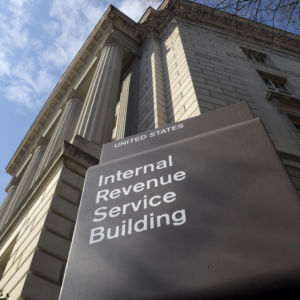Since Benjamin Franklin’s reflection in a 1789 letter that the only two certainties in life are “death and taxes,” few American traditions have been as time-honored as snark at the expense of the Internal Revenue Service — moreso this time of year, with “tax day” on the horizon.
Having worked for the IRS for more than three decades, I know the sentiment spans generations. Iconic 1950s comedian Milton Berle quipped of completing his tax forms, “Who says you can’t get killed by a blank?” Modern hip-hop mogul Dr. Dre said he fears only two things: God and the IRS. But however counterintuitive it may feel, Americans could hardly select a more useful “frenemy” — nor a more guaranteed investment — than the IRS.
The IRS’ role is constitutionally fundamental to the American way of life. Whether your policy priority be national security, education, foreign policy, immigration, farm subsidies or space exploration, revenue — and an organization to collect said revenue — is necessary to fund these programs.
In Fiscal Year 2016, the IRS collected more than $3.3 trillion of the $4 trillion federal budget. The IRS received more than 244 million tax returns and other forms, answered 60 million phone calls, helped elderly citizens prepare 3.8 million returns through special programs, and issued nearly $350 billion in refunds. The IRS website alone was viewed nearly 2 billion times and the online “Where’s My Refund?” tool processed nearly 300 million inquiries.
And added in recent months to the agency’s to-do list: implementation of a sweeping tax reform measure passed by Congress and signed by the president, which will require that significant existing resources and personnel be diverted.
The challenge before the IRS would be Herculean even for a fully staffed, fully funded agency. The problem, of course, is that the IRS is neither of those things. In fact, the picture has grown increasingly bleak in recent years.
Since 2010, the IRS has seen its funding levels slashed by 18 percent. Making matters worse, over that period, the agency has lost 14 percent of its staff. Further complicating the process, tax collection efforts still rely on an infamously complex programming language that is 3 decades old, and programmers proficient in the language are in vanishingly short supply.
Enter President Trump’s recently unveiled budget proposal for 2019, which cuts the IRS’ funding for taxpayers’ services by an additional 8.7 percent, while also slashing more than 4,000 additional IRS employees from the already lean taxpayer services operation.
Some of the challenges stemming from these resource shortfalls are predictable. If the president’s proposed cuts are successful, estimates indicate the IRS’ customer service rate could plummet from 75 percent in 2018 to 47 percent next year, a page presumably pulled from the “If You Aim High, You Set Yourself Up to Fall Far” playbook on government success.
Perhaps even more concerning: the refusal to fund adequately the IRS ultimately amounts to a decision to pass up on vital federal revenue. As former IRS Commissioner John Koskinen succinctly told Congress: “We don’t have enough people to perform all the audits we think are necessary.”
The IRS impressively conducted more than a million audits last year, despite limited resources. Nonetheless, that number was down “about 16 percent from the previous year,” according to the Wall Street Journal, with the IRS auditing only “seven-tenths of 1 percent” of returns, the “lowest audit coverage rate since 2003.”
In effect, the federal government negligently leaves billions of dollars in rightfully owed tax revenue on the table every single year, even as it groans over growing budget shortfalls. In 2017, the “tax gap” — the difference between taxes owed and taxes paid on time — was $458 billion. Only $52 billion of that pool was ultimately collected. Ironically, the national debate over tax reform continues, even as we consistently fail to collect those taxes already on the books.
However Americans may bemoan its existence, the IRS’ mission — as the main artery through which government funds flow to federal agencies — is essential to all government life. Every dollar spent on the IRS results, on average, in four dollars gained. And that’s BEFORE factoring in collections. Every dollar spent on collections efforts results in a gain of between $11 and $13. With the annual tax deadline looming, these truths can be difficult for taxpayers to keep in perspective, but serve as a timely reminder that, as Supreme Court Justice Oliver Wendell Holmes said, “Taxes are what we pay for civilized society.”

